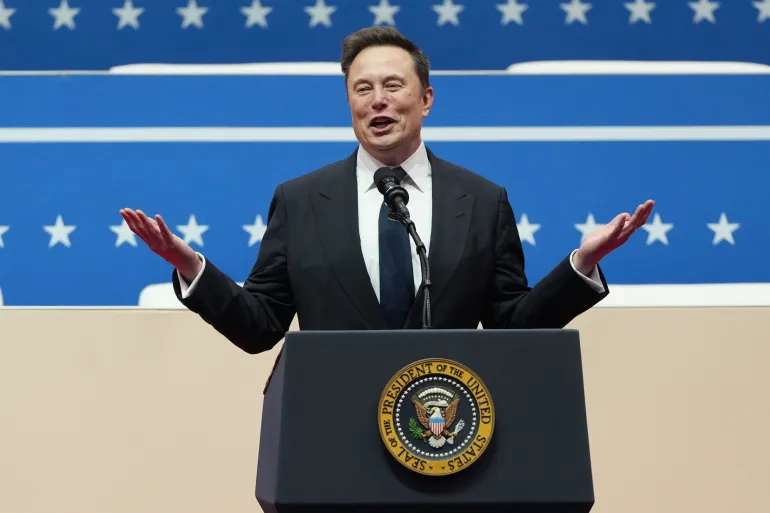In a dramatic escalation of tensions between the U.S. government and billionaire entrepreneur Elon Musk, two top security officials at the United States Agency for International Development (USAID) have been placed on leave following a dispute over access to classified materials. The controversy comes amid broader concerns that President Donald Trump’s administration is planning to radically restructure or dismantle the agency altogether.
The rift between Musk and USAID deepened when the tech mogul, who was appointed by President Trump to lead the newly created Department of Government Efficiency (DOGE), took to his social media platform, X (formerly Twitter), to denounce the agency.
“USAID is a criminal organization. Time for it to die,” Musk posted on X, after his cost-cutting task force was reportedly denied entry to restricted areas at USAID headquarters in Washington, D.C.
USAID’s director of security, John Voorhees, and his deputy, Brian McGill, were subsequently placed on leave for refusing DOGE representatives access to classified materials. According to multiple U.S. media outlets, the security officials cited the DOGE team’s lack of proper security clearance as grounds for their decision. However, DOGE personnel were ultimately granted access to secure areas following the confrontation.
The controversy intensified as conflicting reports emerged over the extent of DOGE’s access to classified information. The White House Director of Communications, Steven Cheung, dismissed claims that Musk’s task force had breached security protocols, labeling a PBS report on the incident as “fake news” and “not even remotely true.”
Meanwhile, Katie Miller, a senior DOGE official, appeared to confirm the attempted entry, stating on X that “no classified material was accessed without proper security clearances.” Despite these assurances, the incident has fueled concerns over the unchecked influence of Musk’s task force and the Trump administration’s aggressive stance on foreign aid.
President Trump has long been a vocal critic of foreign aid spending, and his administration has already implemented a freeze on nearly all foreign assistance programs. The latest developments indicate a potential effort to fold USAID into the Department of State, a move that has raised alarm among lawmakers and international policy experts.
On Saturday, the official USAID website went offline, only for a stripped-down version to reappear on the Department of State’s website. This sudden change has heightened speculation that the agency may be absorbed into the State Department, effectively reducing its autonomy.
Democratic Senator Chris Coons took to X to criticize the Trump administration’s approach, warning that dismantling USAID would be detrimental to U.S. global leadership. “These are patriotic Americans who promote our leadership around the world. They make us safer. Trump makes us less safe,” Coons wrote.
Musk’s growing influence within the federal government has sparked bipartisan concerns. Over the weekend, The New York Times and the Associated Press reported that DOGE had gained access to the federal payment system, which holds sensitive personal data on millions of Americans.
Congresswoman Alexandria Ocasio-Cortez condemned Musk’s involvement in government affairs, arguing that an unelected billionaire should not be granted unrestricted access to classified materials. “This is a five-alarm fire,” she posted on X. “The people elected Donald Trump to be President – not Elon Musk.”
As scrutiny over USAID’s future intensifies, Trump announced that his administration would cut off all future funding to South Africa, citing concerns over land confiscations and alleged mistreatment of “certain classes of people.”
The decision follows South African President Cyril Ramaphosa’s recent signing of a law allowing the expropriation of white-owned farms without compensation. The U.S. allocated nearly $440 million in assistance to South Africa in 2023, but Trump has vowed to halt aid until a “full investigation” into the situation is completed.
The United States remains the world’s largest source of foreign aid, with over $72 billion distributed to nearly 180 countries in 2023. More than half of this funding is managed through USAID, which has historically played a crucial role in humanitarian assistance, global health programs, and economic development.
However, with Trump’s administration doubling down on its “America First” agenda and Musk spearheading an aggressive cost-cutting initiative, USAID’s future remains uncertain. If the administration moves forward with plans to eliminate or absorb the agency, it could mark a significant shift in U.S. foreign policy and global influence.
As the situation unfolds, one thing is clear: the battle over USAID is far from over.
Stay ahead with the latest news on global innovation, leadership, entrepreneurship, business, and tech. Join us on WhatsApp or Telegram for real-time updates. Have a report or article? Send it to report@theinnovationtimes.com.
Follow us on X (Twitter), Instagram, LinkedIn, Pinterest, and Facebook for more insights and trends.



